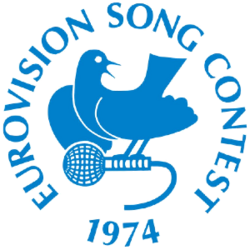
Back مسابقة الأغنية الأوروبية 1974 Arabic 1974 Avroviziya Mahnı Müsabiqəsi AZ Конкурс песні Еўрабачанне 1974 BE Конкурс песьні Эўрабачаньне-1974 BE-X-OLD Евровизия 1974 Bulgarian Eurosong 1974. BS Festival de la Cançó d'Eurovisió 1974 Catalan Europæisk Melodi Grand Prix 1974 Danish Eurovision Song Contest 1974 German Διαγωνισμός Τραγουδιού Eurovision 1974 Greek
| Eurovision Song Contest 1974 | |
|---|---|
 | |
| Dates | |
| Final | 6 April 1974 |
| Host | |
| Venue | The Dome Brighton, United Kingdom |
| Presenter(s) | Katie Boyle |
| Musical director | Ronnie Hazlehurst |
| Director | Michael Hurll |
| EBU scrutineer | Clifford Brown |
| Executive producer | Bill Cotton |
| Host broadcaster | British Broadcasting Corporation (BBC) |
| Website | eurovision |
| Participants | |
| Number of entries | 17 |
| Debuting countries | |
| Returning countries | None |
| Non-returning countries | |
| |
| Vote | |
| Voting system | Ten-member juries distributed ten points among their favourite songs. |
| Winning song | "Waterloo" |
The Eurovision Song Contest 1974 was the 19th edition of the Eurovision Song Contest, held on 6 April 1974 in the Dome in Brighton, United Kingdom. Organised by the European Broadcasting Union (EBU) and host broadcaster the British Broadcasting Corporation (BBC), and presented by Katie Boyle, this was the fifth time that the United Kingdom had staged the contest.
Although Luxembourg had won the 1973 contest with the song "Tu te reconnaîtras" by Anne-Marie David, which made Luxembourg the presumptive host in 1974, the Luxembourgish broadcaster Compagnie Luxembourgeoise de Télédiffusion (CLT) opted not to host the event in 1974 as they had staged the contest in 1973, following their win in 1972. Spain, which had placed second the previous year, also declined the opportunity to stage the contest. The Israeli broadcaster IBA, and the British broadcasters the BBC and ITV, all subsequently made bids to stage the contest, with the BBC ultimately winning out. This was the fourth time that the BBC had staged the contest after another broadcaster declined the opportunity, having done so previously in 1960, 1963 and 1972.
Entries representing eighteen countries were submitted for the contest, with Greece making its first appearance. However, France ultimately did not participate as the contest coincided with the death of French president Georges Pompidou, and with a national day of mourning scheduled for the date of the contest the French broadcaster ORTF deemed participating in the event to be inappropriate. The voting system used between 1971 and 1973 was scrapped, and was replaced by the system last used in 1970, with ten people in each country awarding one vote to their favourite song.
The winner was Sweden, with the song "Waterloo", composed by Benny Andersson and Björn Ulvaeus, written by Stig Anderson and performed by ABBA. Italy and the Netherlands placed second and third respectively, followed by a three-way tie for fourth place between Luxembourg, Monaco and the United Kingdom. It was Sweden's first contest win. After previous success within European markets with "Ring Ring", with which ABBA had attempted to represent Sweden at Eurovision in 1973, "Waterloo" gave the group their first global hit, and their Eurovision win was a launching point for ABBA to become one of the world's best-selling music artists. Olivia Newton-John, who represented the United Kingdom at this event, would also go on to achieve worldwide success in the years following the contest.
